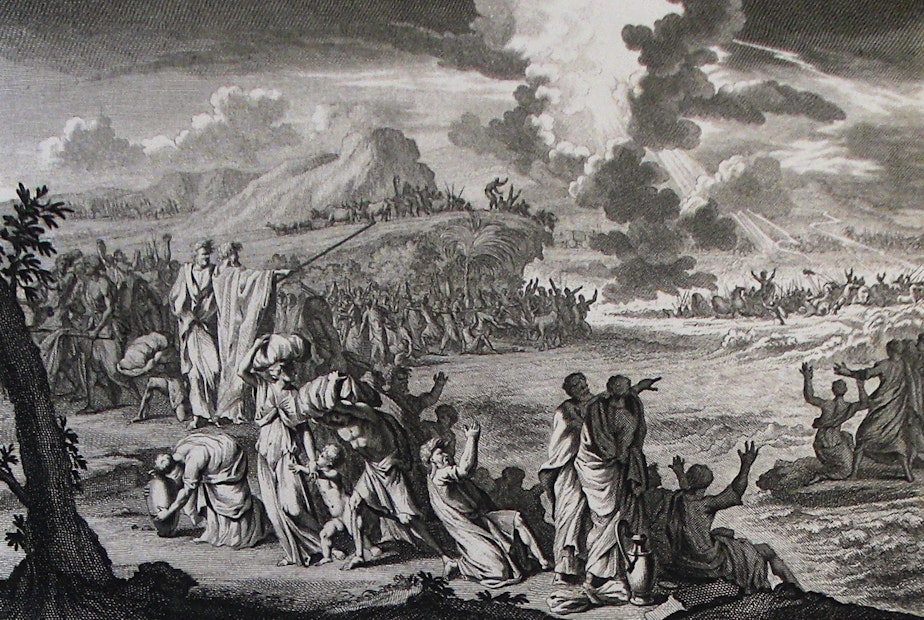Words In Review: Seattle police leave. Is it an “exodus”?

The word "exodus" conjures Moses parting the sea to lead his people from Egyptian bondage to the Promised Land. Does it apply to Seattle police leaving the force? Or residents moving somewhere cheaper?
Since 2020, the Seattle Police Department has lost about 500 officers and hired less than 200. We could call that a net loss, or a departure. But if we want to sound the alarm, we call it an exodus.
The most famous exodus is the Biblical story of Moses leading Israelite slaves out of bondage in Egypt to their promised land.
To figure out what qualifies as an "exodus" we reached out to University of Washington PhD candidate Jake Beckert, who studies the history of Israel/Palestine.
Bill Radke: When people use the word “exodus” to describe, let's say, Seattle police officers leaving the force — what do you think of that use of the word?
Jake Beckert: It's funny, because when you first asked me about it, I didn't jump out of my seat or anything. I say the word “exodus” in everyday contexts, even though I'm frequently thinking about Jewish history and even ancient Jewish literature.
How would you use the word exodus?
Beckert: I think if I was at a sporting event like a baseball game and the other team hit a home run in the ninth and suddenly it seemed insurmountable, and you wanted to get to your car before everyone, I'm like, “Wow, there's a mass exodus of fans right now.” That being said, there's another question of if using this term is accurate in this context. And that's maybe where I have some more questions.
What do you mean by “accurate”?
Beckert: Well, again, it means something different than just exiting. I think it implies a certain size of the amount of people leaving. Is this a big enough departure all at once of these police officers, that we should be using the term exodus? Maybe, maybe not. I think where I definitely think it's incorrect is when it implies this unidirectional nature. So that would imply that officers are leaving, and no new officers are coming. And I also think that's really doesn't reflect the nature of what's happening. Again, I'm not an expert on the police force, but I think it implies that these police have such low morale, they're leaving and no one would ever want to come and that doesn't reflect reality.
Well, there are some unfilled positions.
Beckert: There are some unfilled positions but are people also being hired? Maybe there's more departures than being filled, but that's something we're seeing across the economy. To me, there's not an “exodus” of grocery store workers, which I think gets at the third point here: I think the word exodus is being used because of some of the significance and maybe the moral connotations that people are loading on to it.
Like some people are saying Seattle is so anti-police that these officers are escaping a kind of psychological bondage?
Beckert: Yeah, I'm wondering if that's a little bit of the case. I don't think it's a very intentional choice — I could be wrong there — but I don't personally subscribe to the narrative that there's some sort of oppression or anti-police injustice going on that makes the word exodus the most appropriate use.
Does it seem insensitive to you to be evoking a slavery narrative or a Biblical narrative of a persecuted people?
Beckert: You know, it's funny, the word is decontextualized enough, it's used in common parlance enough.
You did use it at a Mariners game.
Beckert: Exactly. If I'm going to use it at a Mariners game — and probably in the context of the Mariners losing, so that still even has a little bit that connotation — I don't think it's something that we should be offended by. I think there's a reason people want to use vivid and evocative and expressive language and something that taps into these shared narratives. And while we should be careful and thoughtful in doing so. You work in words, you're a radio host —words are the only tapestry you have to paint a picture. Of course, we should use evocative language and meaningful language.
But it’s also why I'm careful. Because I don't want to wear out the actual meaning of the words by always grabbing something overheated. Then they start to lose their punch.
Beckert: I certainly agree with you there. I think this is a word that's been worn down enough that we don't have to terribly worry about it.
It's been done.
Beckert: Yeah, it's been done, it's been chipped away.

